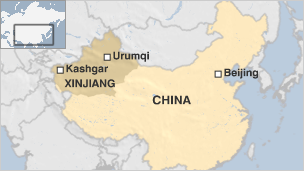Q&A: East Turkestan Islamic Movement
- Published
China's top security official has linked Monday's deadly crash in Beijing's Tiananmen Square to the East Turkestan Islamic Movement. The BBC looks at what is known about the group.
Q: Who are the East Turkestan Islamic Movement?

The East Turkestan Islamic Movement (ETIM) is a small Islamic separatist group said to be active in Xinjiang province in western China.
The province is home to China's ethnic minority Uighur Muslims. East Turkestan is what many Uighurs call Xinjiang.
The US state department, external described ETIM as "the most militant of the ethnic Uighur separatist groups" in 2006. It is said to want to establish an independent "East Turkestan" in China.
ETIM was reportedly founded by Hasan Mahsum, external, an Uighur from Xinjiang's Kashgar region. Listed as China's most-wanted terrorist, he was shot dead by Pakistani troops in 2003.
The group was later led by Abdul Haq, who was also reportedly killed in Pakistan in 2010.
Q: What has ETIM done?
The scope of ETIM's activities is not clear. Information from Xinjiang is tightly controlled, particularly concerning incidents that occur there.
China often blames ETIM or ETIM-inspired groups for outbreaks of violence in Xinjiang, but details are hard to confirm. Sometimes differing accounts of the cause of the violence - that point to ethnic and religious tensions rather than extremism - emerge subsequently.
Uighur groups, meanwhile, claim China exaggerates the threat from ETIM to justify repressive security in the province.
Violent attacks attributed to ETIM tend to be small-scale, and correspondents say that there are questions about the group's capacity to organise any serious acts of terror in China.
According to UN and US reports, ETIM was responsible for several bomb attacks in Xinjiang in the 1990s. In 2002, two ETIM members were deported from Krygyzstan to China for plotting to attack the local US embassy, US reports say.
According to the US State Department's 2011 country terror report, external, ETIM claimed responsibility for an attack that year on a police station in Xinjiang's Hotan that killed four people, and a series of bomb and knife attacks that killed at least 12 in Kashgar.
Q: How dangerous is ETIM?
China describes ETIM as a violent separatist group and a terrorist organisation. Following the Tiananman car crash, Chinese foreign ministry spokeswoman Hua Chunying called the group "the most immediate and realistic security threat in China".
It and other organisations "have long been engaged in central, east and west Asia, and have colluded with other international terrorist organisations", she said.
However, Michael Clarke, a professor at Griffith University in Sydney who has written about Xinjiang, told AFP news agency: "It's not that China shouldn't be concerned [about ETIM's ties to Pakistan and central Asian countries], but the core issue is that the linkages have been exaggerated by the Chinese government."
ETIM is designated, external as a terrorist group by the US under Executive Order 13224, external, an order designed to block financial transactions with groups linked to terrorism, and the US Terrorists Exclusion List, external, which allows the US to prevent individuals linked with terrorist organisations from entering the US.
However, it is not listed as a terrorist group on the State Department's main list of Foreign Terrorist Organisations, external.
US reports on terrorism have noted that: "China does not always distinguish between legitimate political dissent and the advocacy of violence to overthrow the government, and it has used counterterrorism as a pretext to suppress Uighurs."
"China's government characterised Uighur discontent, peaceful political activism, and some forms of religious observance as terrorist activity," it added.